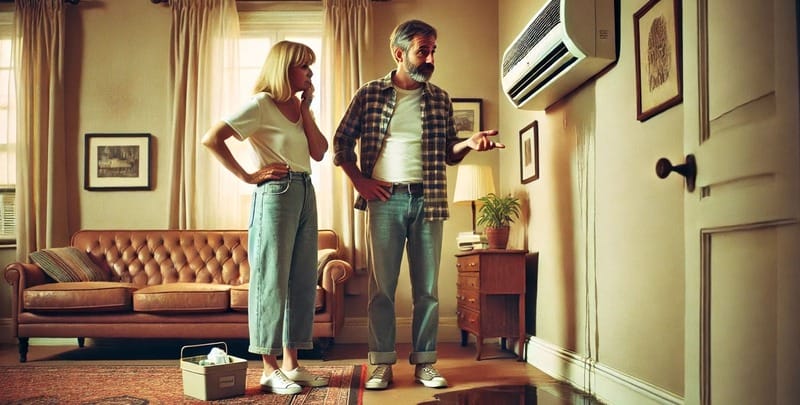
10 Serious Warning Signs You Need a New Air Conditioner
Is your air conditioner not keeping up with the summer heat? Sometimes, an ageing or faulty AC unit will give you clear signs that it’s time for a replacement.
From rising energy bills to strange noises, these warning signals shouldn’t be ignored. Ignoring these signs can lead to bigger issues down the road, like higher costs and uncomfortable living conditions.
If your air conditioning system is showing any of the following signs, it might be time to consider investing in a new system. Let’s take a look at 10 serious warning signs that you need a new air conditioner.
1. Rising Energy Bills
If you’ve noticed your energy bills creeping up, your air conditioner could be the culprit. As AC units age or develop problems, they become less efficient, causing them to work harder and use more energy.
Here’s what to watch for:
- Gradual increase in monthly energy costs without any change in usage.
- AC running longer or more frequently to maintain the same temperature.
- Older units lacking energy-saving features, which newer models often have.
- Unusually high energy consumption even after regular maintenance or filter changes.
These rising costs are a red flag that your air conditioner isn’t performing as efficiently as it should. Upgrading to a new, energy-efficient unit can significantly red
2. Uneven Temperatures
One of the most obvious signs that your air conditioner is struggling is when it can’t cool your home evenly. Do you notice some rooms feel like freezers while others are stuffy and warm?
This inconsistency is often due to a failing system that can no longer distribute air properly throughout your home, particularly with a ducted air conditioning system. Ageing units may have worn-out components like the blower or compressor, which can lead to uneven cooling.
If you’re constantly adjusting the thermostat to try to get comfortable, it’s a red flag that your AC might be on its last legs. Rather than putting up with discomfort, consider upgrading to a new system that will cool your home more efficiently and consistently.

3. Frequent Breakdowns and Repairs
If your air conditioner constantly needs repairs, it’s a clear sign that it’s nearing the end of its lifespan. Frequent breakdowns can add up quickly, and at some point, it makes more sense to replace the unit.
Here are the warning signs:
- Repeated repair calls within a short period, even after fixing issues.
- Costs of repairs adding up to nearly half the price of a new AC unit.
- Temporary fixes that don’t seem to last long before another problem arises.
- Older unit with worn-out parts that are harder to find or replace.
Rather than continuing to spend money on constant repairs, consider investing in a new air conditioner. It will save you time, money, and the hassle of dealing with recurring issues.
4. Strange Noises Coming from the AC Unit
If your air conditioner starts making strange noises like banging, grinding, or squealing, it’s trying to tell you something isn’t right. These unusual sounds often point to internal issues, such as loose or broken components, a failing motor, or debris inside the unit.
While some noises might just mean a small repair is needed, persistent or loud sounds usually signal bigger problems. A well-functioning air conditioner should operate quietly in the background, so if your unit is causing a racket, it’s time to pay attention.
Ignoring these sounds could lead to more damage, so consider replacing your AC before it turns into an even bigger (and noisier) headache.

5. Bad Odours Circulating from Your AC
Strange or unpleasant smells coming from your air conditioner are a strong indicator that something is wrong. If your AC is emitting bad odours, it could point to various issues, including:
- Musty or mouldy smells that suggest mould or mildew is growing inside the unit or ductwork.
- Burning or smoky odours indicating possible wiring or electrical issues.
- Foul or rotten smells, which might mean a pest has made its way into the system.
Ignoring these odours can lead to health issues or further damage to your air conditioner. If you notice persistent bad smells, it’s best to get the unit checked by a professional heating, ventilation and air conditioning (HVAC) technician. Sometimes, these odours are signs that a replacement is the best solution to avoid larger problems down the line.
6. Poor Airflow Throughout the Home
Weak or poor airflow is a clear indication that something is wrong with your air conditioner. If you notice that the cool air barely trickles out of your vents, it’s likely your AC is struggling.
This could be due to a failing compressor, clogged air filters or even ductwork problems. Poor airflow not only affects your comfort but can also lead to higher energy bills as the system works harder to cool your home. If the issue persists despite cleaning or minor repairs, it may be time to consider a replacement.
A new air conditioner will provide stronger, more consistent airflow, ensuring every room in your home is properly cooled and comfortable.
7. Excessive Humidity Levels Indoors
Your air conditioner should help control the humidity in your home, but if you notice higher-than-normal moisture levels, it could mean your AC is struggling. Here are some key signs:
- Sticky or damp feeling in the air, even when the AC is running.
- Foggy windows or condensation forming inside the home.
- Increased mould growth in damp areas like bathrooms or basements.
- Uncomfortable indoor environment, even with the AC set to a lower temperature.
Excessive humidity can lead to discomfort, mould growth and damage to your home’s structure. If your air conditioner can no longer keep humidity under control, it may be time to consider replacing it with a more efficient system that can properly cool and dehumidify your home.
8. Visible Leaks or Moisture Around the Unit
If you spot leaks or moisture pooling around your air conditioner, it’s a sign that something’s wrong. This could be caused by a refrigerant leak, which not only affects your AC’s ability to cool but can also pose health risks.
Alternatively, excess moisture might be due to a blocked or broken condensate drain, leading to water damage in your home. Leaks can also cause mould growth, which further affects indoor air quality and your health. While small amounts of condensation are normal, significant moisture or visible leaks should not be ignored.
If your AC is leaking, it might be time for a replacement to prevent costly repairs and potential damage to your home.

9. Old Age of the Unit
Air conditioners aren’t designed to last forever. Most units have a lifespan of about 10 to 15 years, and as they age, they become less efficient and more prone to breakdowns.
If your AC is nearing or past this age range, it’s likely time to start thinking about a replacement. Older units not only struggle to keep your home cool but also consume more energy, leading to higher utility bills. Additionally, outdated systems often lack the energy-efficient features and technology found in modern models.
Rather than sinking money into repairs for an ageing unit, investing in a new HVAC system will save you money in the long run and provide better comfort for your home.
10. Inability to Meet Energy-Efficient Standards
If your air conditioner is outdated, it may struggle to meet modern energy-efficient and smart technology standards.
Here’s how to tell if your unit is behind the times:
- Lack of energy-saving features, like variable speed motors or programmable thermostats.
- Higher energy consumption compared to newer, energy-efficient models.
- Incompatibility with smart home systems, meaning you can’t control it remotely or optimise performance.
- Rising energy bills, even with proper maintenance, indicating inefficiency.
Upgrading to a smart, energy-efficient air conditioner can drastically lower your energy bills and improve your home’s comfort. Newer models allow you to control your AC remotely, set schedules, and monitor energy usage, making them a worthwhile investment for your home’s long-term efficiency.
Time to Consider a Replacement
If your air conditioner is showing any of these warning signs, it may be time to consider a replacement. Ignoring the issues could lead to more costly repairs, higher energy bills, and discomfort in your home.
A new air conditioner not only provides better cooling but also offers improved energy efficiency and modern features that can save you money in the long run. If you’re unsure whether it’s time to replace your AC, consult a HVAC professional for an evaluation.
Taking action now can help ensure your home stays cool and comfortable when you need it most.
Please note: This information is provided for advice purposes only. Regulations differ from state to state, so please consult your local authorities or an industry professional before proceeding with any work. See Cyber Air Conditioning’s Terms & Conditions here.
